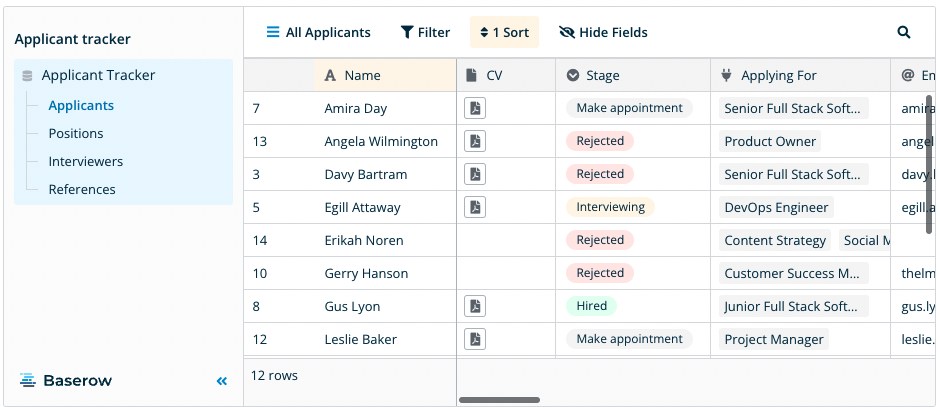The burgeoning low-code and no-code movement is showing little sign of waning, with numerous startups continuing to raise sizable sums to help the less-technical workforce develop and deploy software with ease. Arguably one of the most notable examples of this trend is Airtable, a 10-year-old business that recently attained a whopping $11 billion valuation for a no-code platform used by firms such as Netflix and Shopify to create relational databases.
In tandem, we’re also seeing a rise in “open source alternatives” to some of the big-name technology incumbents, from Google’s backend-as-a-service platform Firebase to open source scheduling infrastructure that seeks to supplant the mighty Calendly.
A young Dutch company called Baserow sits at the intersection of both these trends, pitching itself as an open source Airbase alternative that helps people build databases with minimal technical prowess. Today, Baserow announced that it has raised €5 million ($5.2 million) in seed funding to launch a suite of new premium and enterprise products in the coming months, transforming the platform from its current database-focused foundation into a “complete, open source no-code toolchain,” co-founder and CEO Bram Wiepjes told TechCrunch.
Building databases
So what, exactly, does Baserow do in its current guise? Well, anyone with even the most rudimentary spreadsheet skills can use Baserow for use-cases spanning content marketing, such as managing brand assets collaboratively across teams; managing and organizing events; helping HR teams or startups manage and track applicants for a new role; and countless more, which Baserow provides pre-built templates for.

One specific real-world example cited by Baserow co-founder and chief revenue officer (CRO) Olivier Maes involved a regional municipality in France that sought to create a platform to help local farmers register their produce and declare where it’s sold in the region. This allowed customers to see what produce is available where, with local retailers able to use the same application to source specific products. An underlying database infrastructure was needed to store and display all this information, which is where Baserow entered the fray.
“In this case, all the data behind the website is managed by Baserow and integrates with n8n for workflow automations back to the external website portals,” Maes explained. “This is a typical use case with multiple stakeholders who need to input, view and modify data [and need to] do so without any technical skill requirements.”

The open source factor
Baserow’s open source credentials are arguably its core selling point, with the promise of greater extensibility and customizations (users can create their own plug-ins to enhance its functionality, similar to how WordPress works) — this is a particularly alluring proposition for businesses with very specific or niche use cases that aren’t well supported from an off-the-shelf SaaS solution.
On top of that, some sectors require full control of their data and technology stack for security or compliance purposes. This is where open source really comes into its own, given that businesses can host the product themselves and circumvent vendor lock-in.
“If a company or public sector entity uses Baserow to collaborate on sensitive data and builds all sorts of processes around it, they do not want to be faced with the risk of losing any of that work or applications in the future,” Wiepjes explained. “Offering an open source software alleviates that risk, as the source code is in the hands of our users, forever.”
It’s also worth noting that open source generally lowers the barrier to entry, as it usually ships with a free version that anyone can deploy themselves. Typically, this requires significant technical know-how, which is where commercial entities often monetize their product with premium features and services that make it easier and quicker to use. However, given that Baserow’s core raison d’être is appealing to the less-technically minded people in the workforce, it has had to make its base product usable like an off-the-shelf SaaS tool.
“Baserow can be used by anyone who needs to organize and collaborate on data — we believe we will attract SMEs, public sector organizations and enterprise users,” Maes said.
With a fresh €5 million in the bank, Baserow is planning to double down on its commercial efforts, starting with a premium incarnation that’s officially launching out of an early access program later this month. This offering will be available as a SaaS and self-hosted product and will include various features such as the ability to export in different formats; user management tools for admin; Kanban view; and more. An additional “advanced” product will also be made available purely for SaaS customers and will include a higher data storage limit and service level agreements (SLAs).
Although Baserow has operated under the radar somewhat since its official foundation in Amsterdam last year, it claims to have 10,000 active users, 100 sponsors who donate to the project via GitHub and 800 users already on the waiting list for its premium version.
Later this year, Baserow plans to introduce a paid enterprise version for self-hosting customers, with support for specific requirements such as audit logs, single sign-on (SSO), role-based access control and more.
Until then, Baserow and its no-code/low-code ilk will continue to tout their abilities to plug the much-discussed tech talent gap by giving anyone in a company the ability to create their own databases — this is a problem that impacts companies of all sizes, from small indie firms to the biggest global conglomerates.
“There is a tremendous global shortage of developers today, and a huge need for applications that cater to the specific needs of teams in enterprises,” Wiepjes added. “A lot of data is still captured and manipulated in Excel spreadsheets by ops teams — often heavily understaffed — who try to provide insights, keep track of progress and build dashboards.”
Baserow’s seed round was led by Amsterdam-based early-stage investor Inkef, with participation from Firstminute Capital, Seedcamp, Frontline and angel investors including Remote’s Job van der Voort and Pipedrive’s Martin Henk.

